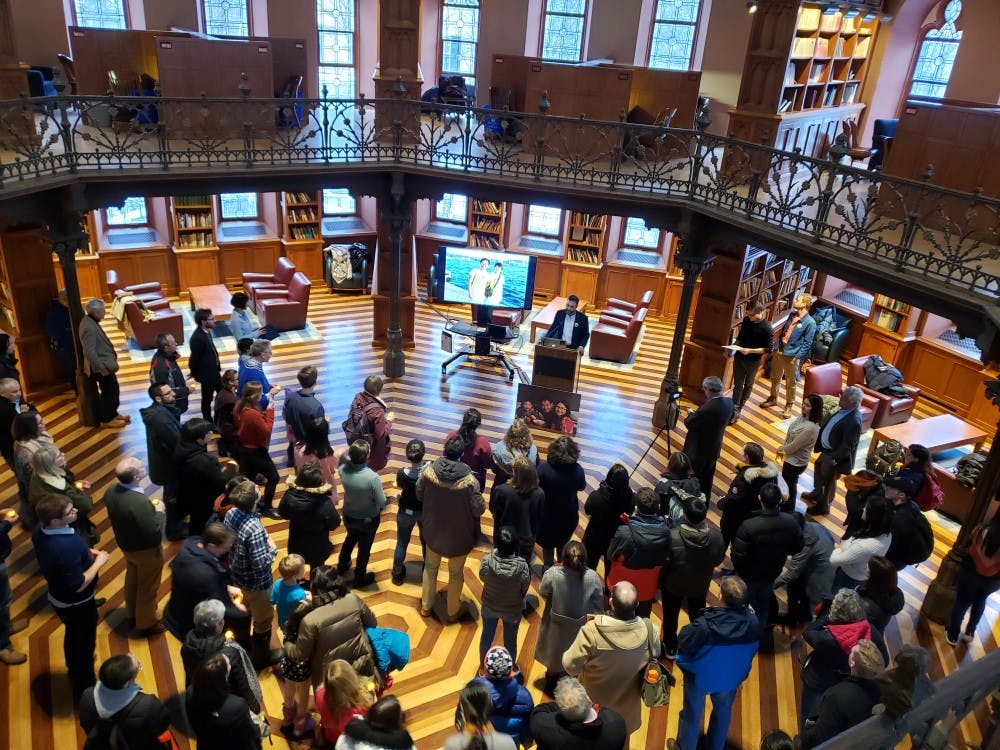On the third anniversary of Xiyue Wang’s detainment in Iran, Wang’s wife, Hua Qu, spoke at the National Press Club in Washington, D.C., urging the Trump administration and the international community to do more to secure his release.
"I implore Iran, the United States, my home country, China, and other members of the international community to secure the release of this innocent man, Xiyue Wang, and make our family whole again," she said on Aug. 8, three years and a day after Wang’s arrest on Aug. 7., 2016.
Wang, a graduate student in history specializing in late 19th and early 20th century Eurasian history, was in Iran studying Farsi and completing research for his doctoral dissertation. Despite his academic work, he was arrested, convicted of espionage, and sentenced to 10 years in the notorious Evin Prison.
In her speech, Qu said that her husband and family members had become political pawns and “innocent victims in an apparently ever-intensifying quarrel between world powers.”
“My husband is an academic researcher. He’s a father, a husband. He is not a political figure, and he definitely is not a spy,” she said.
Qu called for a resumption of diplomatic talks and negotiations. Productive conversations about the release of Wang and other political prisoners have come to a standstill as tensions between the U.S. and Iran have risen. The Trump administration’s decision in May 2018 to unilaterally withdraw from the 2015 nuclear deal and Tehran’s downing of an American surveillance drone in June have only complicated matters.
Although Qu noted the efforts of the Special Presidential Envoy for Hostage Affairs Robert O’Brien, she urged that the same consideration be paid to Wang’s case as to that of A$AP Rocky, an American rapper who was freed from a Swedish jail last week after the President intervened.
“I believe the ordeal of my husband and other unjust detention cases deserve the same level of attention,” Qu said.
“We all know that nothing is impossible — all it takes is will,” Qu also said, imploring the Trump administration to act.
Sarah-Jane Leslie, the dean of the Graduate School, also released a statement on Aug. 7 appealing for Wang’s immediate release.
“Many of the graduate students who entered Princeton with him completed their degrees this year; it is well past time for him to be permitted to return to his studies and complete his degree,” she wrote.
In an investigation last year, the U.N. Working Group on Arbitrary Detention found no legal basis for his arrest, concluding that his detention was “arbitrary,” and that Wang was given an unfair trial and sentence.

These sentiments were echoed by three U.N. experts on human rights, who wrote in a statement issued this spring that “Iranian authorities’ use of espionage charges against Mr. Wang simply for having sought access to century-old historical documents reaches the level of absurdity.”
The groups also expressed concern for his health and welfare in the harsh conditions of the prison. The American Council on Education, the International Science Council, and the European University Association have also joined the calls for Wang’s release.
On Feb. 20 of this year, graduate students organized in a Day of Action, including a “call-a-thon” to elected representatives, a rally, and a candlelight vigil. Students and community members gathered to advocate for Wang’s cause and send postcards to representatives, friends, family, and “anyone with influence.”
At the Communiversity ArtsFest in April, Qu and others staffed a booth to raise awareness, urging passersby to write to elected officials.
Despite these efforts, little has changed in Wang’s case, as Qu expressed in her speech.
As the U.S. and Iran have no diplomatic relations, the Swiss consulate functions as a go-between for the Iranian government and the State Department. Qu said that her last interaction with authorities was two months ago. And although she discussed the case with the State Department last week, she noted, “there has literally been no progress.”
Qu spoke about the impact of Wang’s imprisonment on their six-year-old son, Shaofan, who was only three when Wang left for Iran.
When they moved to a new apartment recently, Shaofan asked if his father would be able to find them, Qu recounted. But, she added, Shaofan has few memories of those early times with his father.
“I continue to pray that when Shaofan blows out his birthday candles next year, Xiyue will be right there with us,”she said.








